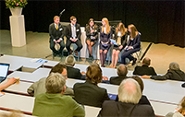
Why fundamental science matters
Why do we need fundamental science? For a lot of reasons, speakers showed at the Lustrum Symposium ‘Science Matters’. This symposium was held on 18 March 2016 to celebrate the 200th anniversary of the Faculty of Science.
The practical use of science often becomes apparent only decades later. Just look at quantum entanglement. Albert Einstein and Niels Bohr had a lively debate on this matter at the beginning of the last century. Is nature based on chance or not? In 1964 the British physicist John Bell devised an experiment that could settle the matter. But Bell’s experiment was so complex that it wasn’t until 51 years later that scientists eventually succeeded in carrying it out. Fast forward to 2016, and practical applications are rapidly coming into view, as shown by Carlo Beenakker, Leiden Professor of Theoretical Physics, in his presentation. He predicts that quantum technology is going to turn our world upside down. This is an expectation also shared by politicians, as shown by the Quantum Manifesto, an appeal being made by Minister of Economic Affairs Henk Kamp and others to invest one billion euros in quantum technology research.
Curiosity
‘My best research starts out as curiosity,’ says Hermen Overkleeft. Over the past 25 years, this Professor of Biochemistry has made numerous ‘special-purpose molecules’. For example, some of these molecules inhibit biological processes or make them visible. This has led to a number of patented medicines. Overkleeft worries about the increasing role of top-down financing for research, such as in the Top Sector Policy and the National Science Agenda. This is why he is arguing for curiosity-driven research.

A source of inspiration
Fundamental science has value as a source of inspiration. This was the argument put forth by Ewine van Dishoeck, Professor of Astronomy, in her presentation, which was the final talk in the plenary session. She considers outreach and education to be uses of information that are just as important as technological spin-offs. ‘We do this better than any other faculty in the Netherlands,’ Van Dishoeck says proudly, and she lists a bevy of examples to illustrate her point. From the Heel Holland Kijkt Sterren television programme on astrology to Universe Awareness workshop, and from the Very Large Telescope in the James Bond Quantum of Solace film to the iSPEX app. ‘Please, get out there and inspire the public with fundamental research’ is her message to the attendees.
4 themes, 8 approaches
Similar songs of praise for basic research could also be heard in the parallel sessions. Eight speakers discussed four different themes: Big Data, Health, Energy & Sustainability and Materials.
In the Big Data session, Data Science Professor Aske Plaat showed how it was ‘doctors and data that cured Ebola’. By intelligent use of telephone user data, data scientists were able to help doctors be at the right place at the right time. The calculations that Astronomy Professor Simon Portegies Zwart conducts on star systems are so complex that he needs to develop supercomputers and clever algorithms to run them. And these can be then reused for other fields, as well.
In the Energy & Sustainability session, Jan Zaanen, Professor of Theoretical Physics, examined developments that lie ahead for the application of superconductivity in the area of energy transport. The phenomenon was discovered accidentally by Heike Kamerlingh Onnes in 1911. Superconductivity is already being used in suspension trains, MRI scanners and particle accelerators, and it will soon be employed in energy-efficient power cables. Arjen Doelman, Professor of Applied Analysis, showed an unexpected cross-pollination between mathematics and ecology. Models that describe patterns turn out to be readily applicable in ecology. They are currently being used in the Israeli desert in efforts to reverse desertification.
 Wrap-up
Wrap-up
Jan Douwe Kroeske was the chair of the symposium. In the concluding plenary session he presented a recap of all the talks, together with a panel of students. Science Matters attendees got an amazing glimpse into the complexity and beauty of science in Leiden. But more importantly, the symposium showed that if practical applications are what you seek, there is simply no getting around curiosity-driven fundamental science.
